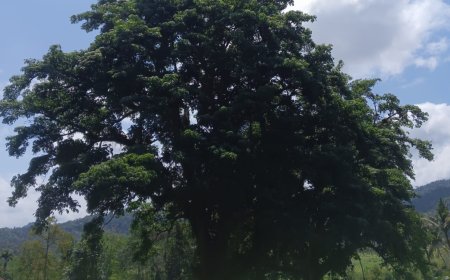I Watugunung : The Figure Behind the Sacred Saraswati Day Series Who Loves and Wants to Marry His Mother
The story of I Watugunung is one of the most famous in Bali. It narrates the story of a figure named I Watugunung who loves and desires to marry his biological mother. This story also serves as the origin of the sacred Saraswati Day celebration, which falls on Saturday in the Wuku Watugunung. Watugunung, with his unparalleled strength, is fond of looting, defeating formidable attacking groups, and conquering numerous kingdoms, including his former kingdom, the Kundadwipa Kingdom, where he began to love his mother.
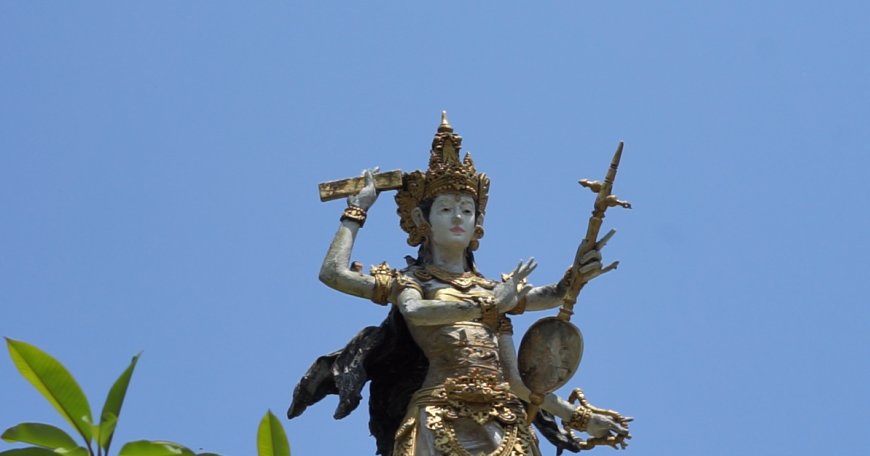
Saraswati Day is one of the sacred celebrations observed every 210 days by Hindu believers. On this day, Hindus worship Goddess (Dewi) Saraswati as the deity of knowledge, as Saraswati Day symbolizes the descent of knowledge. Interestingly, Saraswati Day is closely connected to the story of a child who falls in love and intends to marry his biological mother. The child's name is I Watugunung. Many may already be familiar with the term Watugunung, as it represents the final wuku in the 210-day cycle of the Javanese and Balinese calendars, with each wuku lasting for 7 days.

I Watugunung (Photo Source: Private Collection)
In the Medang Kemulan manuscript, there is mention of a kingdom called Kundadwipa. This kingdom was ruled by King Kulagiri, who had two queens, namely Dewi Sintakasih and Dewi Sanjiwartia. One day, while King Kulagiri was in meditation on Mount Semeru, he left behind his pregnant wife, Dewi Sintakasih. Eventually, Dewi Sintakasih decided to follow King Kulagiri to Mount Semeru. However, during the journey, Dewi Sintakasih gave birth on a large flat rock, and the baby she delivered fell from it. Strangely, the baby was unharmed, and instead, the rock that the baby struck split into two parts. This baby would later be known by the name I Watugunung.
Since baby, Watugunung has displayed an extraordinary will and desire that surpass normal bounds, marked by a strong and increasing appetite. Due to his insatiable hunger, his mother often found it overwhelming to satisfy him. One day, Watugunung asked for food, and his overwhelmed mother couldn't control her emotions. Consequently, Watugunung's head was struck by his mother with a rice spoon, causing a wound that bled. As a result of this incident, Watugunung decided to leave the kingdom.
During his journey away from the palace, he wandered and meditated to seek extraordinary powers. With the immense powers he acquired, Watugunung acted recklessly, especially when it came to food. Watugunung enjoyed plundering the people's food and consuming it immediately. All layers of power in the region felt uneasy and attacked Watugunung, striking him with various weapons, besieging him, and attacking from all directions. Unfortunately, none of the attacks and weapons could harm Watugunung. He then became extremely arrogant and haughty, continuing his actions to seize food, launch attacks, and destroy those formidable attacking groups.
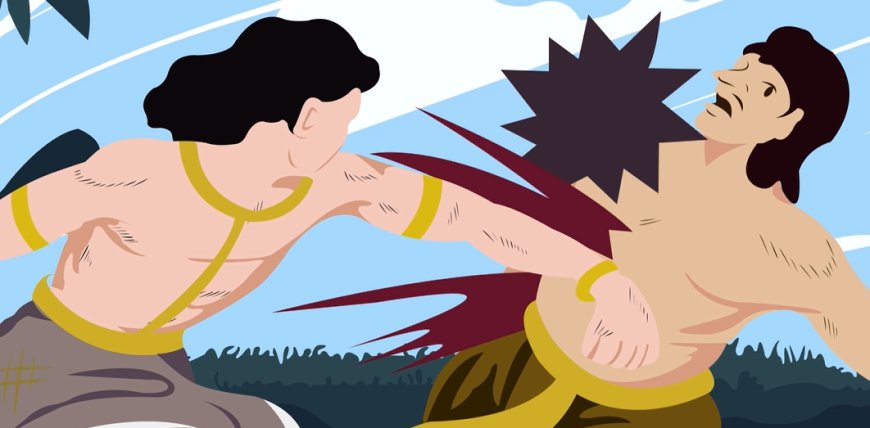
I Watugunung Attacking Villagers (Photo Source: Private Collection)
Watugunung, blessed with unmatched power, conquered all the kingdoms he encountered, including his former kingdom, Kundadwipa. After conquering Kundadwipa, he contemplated marrying the queen of the realm, Dewi Sintakasih, who happened to be his biological mother. Dewi Sintakasih, recognizing the signs that the young man who conquered the kingdom was her son, then devised a plan to remove Watugunung. Dewi Sintakasih then asked Watugunung to attack the heavenly realms before marrying her. Watugunung, feeling arrogant due to his strength but lacking knowledge, attempted to attack the celestial realms. However, he was easily defeated by the gods, and his body fell back to Earth.
The day when Watugunung's body fell to the earth is later known as Watugunung Runtuh or Kajeng Kliwon Pamelastali. According to the myths circulating in Balinese society, if it rains on the day of Kajeng Kliwon Pamelastali, it is believed that Watugunung's body fell on the land. This is because Watugunung requested that if he were to be dropped on land, the earth would be soaked with rain so that he wouldn't feel overheated. Conversely, if there is no rain or the sky is bright and clear, it is believed that Watugunung's body fell into the sea so that, in the scorching heat, he wouldn't feel cold.
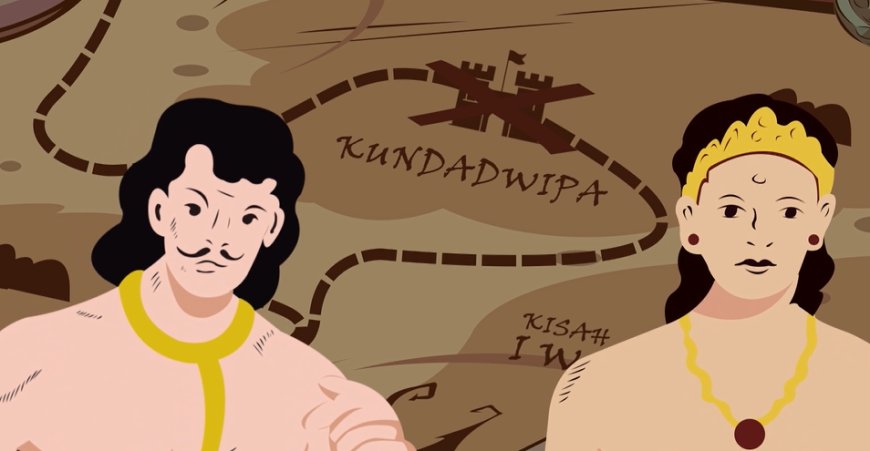
I Watugunung and His Mother, Dewi Sintakasih (Photo Source: Private Collection)
Watugunung's body subsequently transformed into a corpse, known in Balinese as watang. Therefore, Monday in the Wuku Watugunung is also known as Soma Candung Watang. As a mother, Dewi Sintakasih felt pity for her son, so she pleaded with the gods to bring him back to life. The next day, Watugunung's corpse was dragged or paid (a Balinese term for dragging) to be revived, making Tuesday in the Wuku Watugunung known as Anggara Paid-Paidan.
On Wednesday, the gods revived I Watugunung, and thus Wednesday in the Wuku Watugunung is known as Buda Urip. After being revived, Watugunung was given strength and took a brief rest or mategegan. Therefore, Thursday in the Wuku Watugunung is known as Wrespati Panegtegan. Watugunung then cleansed himself, observed tapa brata, sought knowledge, and was taught etiquette and how to respect the knowledgeable gods. Consequently, Friday in the Wuku Watugunung is known as Sukra Pangredanan.
The gods then bestowed knowledge, which is subsequently celebrated as Saraswati Day, falling on Saturday in the Wuku Watugunung. Hindu devotees celebrate the descent of knowledge by expressing gratitude, giving thanks, and seeking guidance in knowledge for their life's journey.
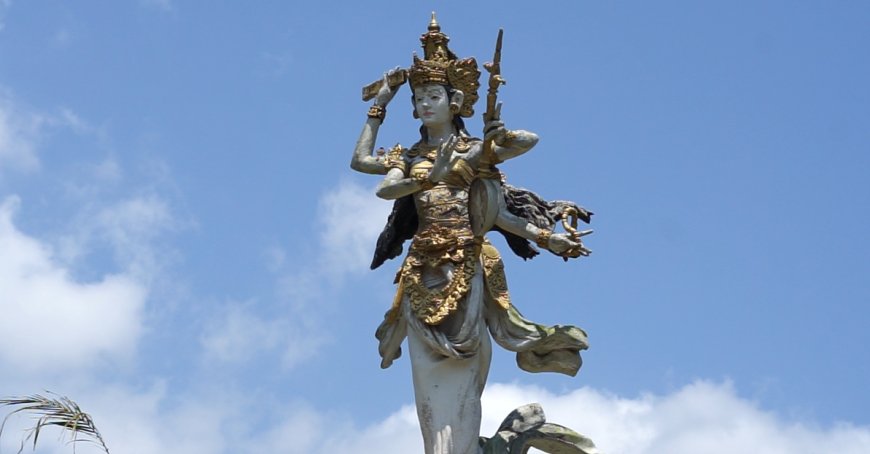
Statue of Goddess Saraswati (Photo Source: Private Collection)
The story of Watugunung is rich with the meaning that being able to combat ignorance is the beginning of the descent of knowledge. All bonds of ignorance or negative traits within Watugunung must be released. We also have to learn to honor women as we would honor a mother because a mother or a woman is an aspect of creation and the initial cause of creation itself.

















































